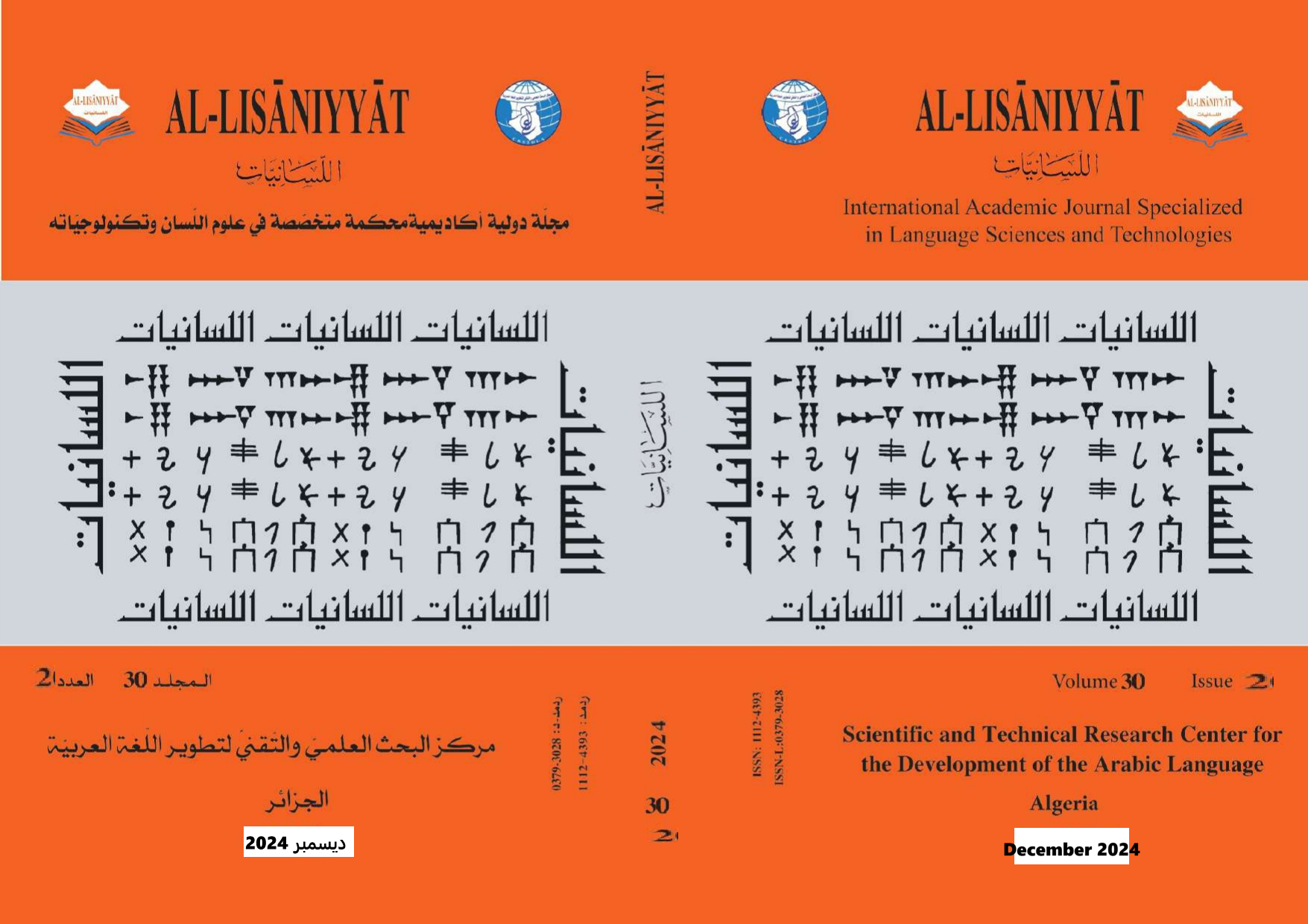Illocutionary dimension of interrogation in the holy Quran: an analysis through Abu al-Saoud's exegesis
Main Article Content
Abstract
This research explores a pivotal aspect of speech acts, specifically the interrogative mode, which constitutes a significant requestive act in Arabic rhetoric. It aligns with directive speech acts within the scope of pragmatics, transitioning from mere informative expression to an illocutionary act that engenders an illocutionary force contingent upon the context. Its importance in dialogue, argumentation, and the potential to influence the recipient is profound. Additionally, this study endeavors to create a synthesis between the rich linguistic heritage of ancient Arabic and the theoretical frameworks of contemporary Western linguistics.
The primary objective of this research is to uncover the illocutionary dimension embedded in the interrogatives of the Holy Quran, as interpreted by Abu al-Saoud in his work "Irshad al-Aql al-Salim ila Mazaya al-Kitab al-Hakim" (The Guidance of the Sound Mind to the Virtues of the Holy Book). This exegesis, rich in rhetorical applications, pays close attention to communicative intents and purposes, highlighting the pragmatic practices within. The investigation reveals the intrinsic illocutionary force necessitated by the use of interrogatives and delves into Abu al-Saoud's approach to pragmatic exegesis.
Plum Analytics
Artifact Widget
Article Details
In accordance with its open access publishing policy, AL-Lisaniyyat acknowledges and guarantees authors the full and exclusive ownership of copyright and intellectual property rights related to their scholarly contributions.
The publication of an article in the journal does not result in any transfer, assignment, or limitation of these rights. Authors retain full rights over their works, without the requirement to obtain prior written authorization from the journal.
References
حجي، الصراف علي محمود. (2010). في البراجماتية "الأفعال الانجازية في العربية المعاصرة دراسة دلالية ومعجم سياقي. القاهرة: مكتبة الآداب.
السكاكي. (1987). مفتاح العلوم(ط2). نعيم زرزور (محقق). لبنان: دار الكتب العلمية.
صحراوي، مسعود. (2023). القوى الإنجازية عند ج. سيرل: بنيتها ومنهج تصنيفها. مجلة تداوليات، 1(1).
الطبطبائي. (1994). نظرية الأفعال الكلامية بين فلاسفة اللغة المعاصرين والبلاغيين العرب (د. ت). الكويت: مطبوعات جامعة الكويت.
العبد، محمد. (2005). تعديل القوة الإنجازية دراسة في التحليل التداولي للخطاب. مجلة النقد الأدبي.
العمادي، السعود محمد بن محمد (د. ت). تفسير أبي السعود المسمى إرشاد العقل السليم إلى مزايا القرآن الكريم. لبنان: دار إحياء التراث العربي.
كروم، أحمد. (2015). مقاصد اللغة وأثرها في فهم الخطاب الشرعي. عمان: كنوز المعرفة
لحسناوي، فضاء ذياب غليم. (2016). الأبعاد التداولية عند الأصوليين،مدرسة النجف الحديثة أنموذج. بيروت: مركز الحضارة لتنمية الفكر الإسلامي.
المتوكل أحمد. (1993). أفاق جديدة في نظرية النحو الوظيفي. المغرب: دار الهلال العربية.
نحلة محمود أحمد. (د.ت) . أفاق جديدة في البحث اللغوي المعاصر. مصر: دار المعرفة الجامعية
Romanized References
al-Ḥājj Ṣāliḥ, ʿAbd al-Raḥmān. (1971). Madkhal ilā ʿilm al-lisān al-ḥadīth: taḥlīl wa-naqd li-aham mafāhīmihi wa-manāhijihi. Al-Lisāniyyāt, 1(1).
al-Ḥajjī, al-Ṣarrāf ʿAlī Maḥmūd. (2010). Fī al-barāgmatiyya: al-afʿāl al-injāziyya fī al-ʿArabiyya al-muʿāṣira – dirāsa dalāliyya wa-muʿjam siyāqī. al-Qāhira: Maktabat al-Ādāb.
al-Sakkākī. (1987). Miftāḥ al-ʿulūm (2nd ed., Naʿīm Zarzūr, ed.). Lubnān: Dār al-Kutub al-ʿIlmiyya.
Ṣaḥrāwī, Masʿūd. (2023). Al-quwā al-injāziyya ʿinda J. Sīrl: biniyatuhā wa-manhaj taṣnīfihā. Majallat Tadāwuliyyāt, 1(1).
al-Ṭabāṭabāʾī. (1994). Naẓariyyat al-afʿāl al-kalāmiyya bayna falāsifat al-lugha al-muʿāṣirīn wa-l-balāghiyyīn al-ʿArab (n.d.). al-Kuwayt: Maṭbūʿāt Jāmiʿat al-Kuwayt.
al-ʿAbd, Muḥammad. (2005). Taʿdīl al-quwwa al-injāziyya: dirāsa fī al-taḥlīl al-tadāwulī li-l-khiṭāb. Majallat al-Naqd al-Adabī.
al-ʿUmādī, al-Saʿūd Muḥammad ibn Muḥammad. (n.d.). Tafsīr Abī al-Saʿūd al-musammā Irshād al-ʿaql al-salīm ilā mayāzā al-Qurʾān al-Karīm. Lubnān: Dār Iḥyāʾ al-Turāth al-ʿArabī.
Kurūm, Aḥmad. (2015). Maqāṣid al-lugha wa-atharuhā fī fahm al-khiṭāb al-sharʿī. ʿAmmān: Kunūz al-Maʿrifa.
Laḥsanāwī, Faḍāʾ Dhiʾāb Ghulaym. (2016). Al-abʿād al-tadāwuliyya ʿinda al-uṣūliyyīn: madrasat al-Najaf al-ḥadītha namūdhaj. Bayrūt: Markaz al-Ḥaḍāra li-Tanmiyat al-Fikr al-Islāmī.
al-Mutawakkil, Aḥmad. (1993). Āfāq jadīda fī naẓariyyat al-naḥw al-waẓīfī. al-Maghrib: Dār al-Hilāl al-ʿArabiyya.
Naḥla, Maḥmūd Aḥmad. (n.d.). Āfāq jadīda fī al-baḥth al-lughawī al-muʿāṣir. Miṣr: Dār al-Maʿrifa al-Jāmiʿiyya.




